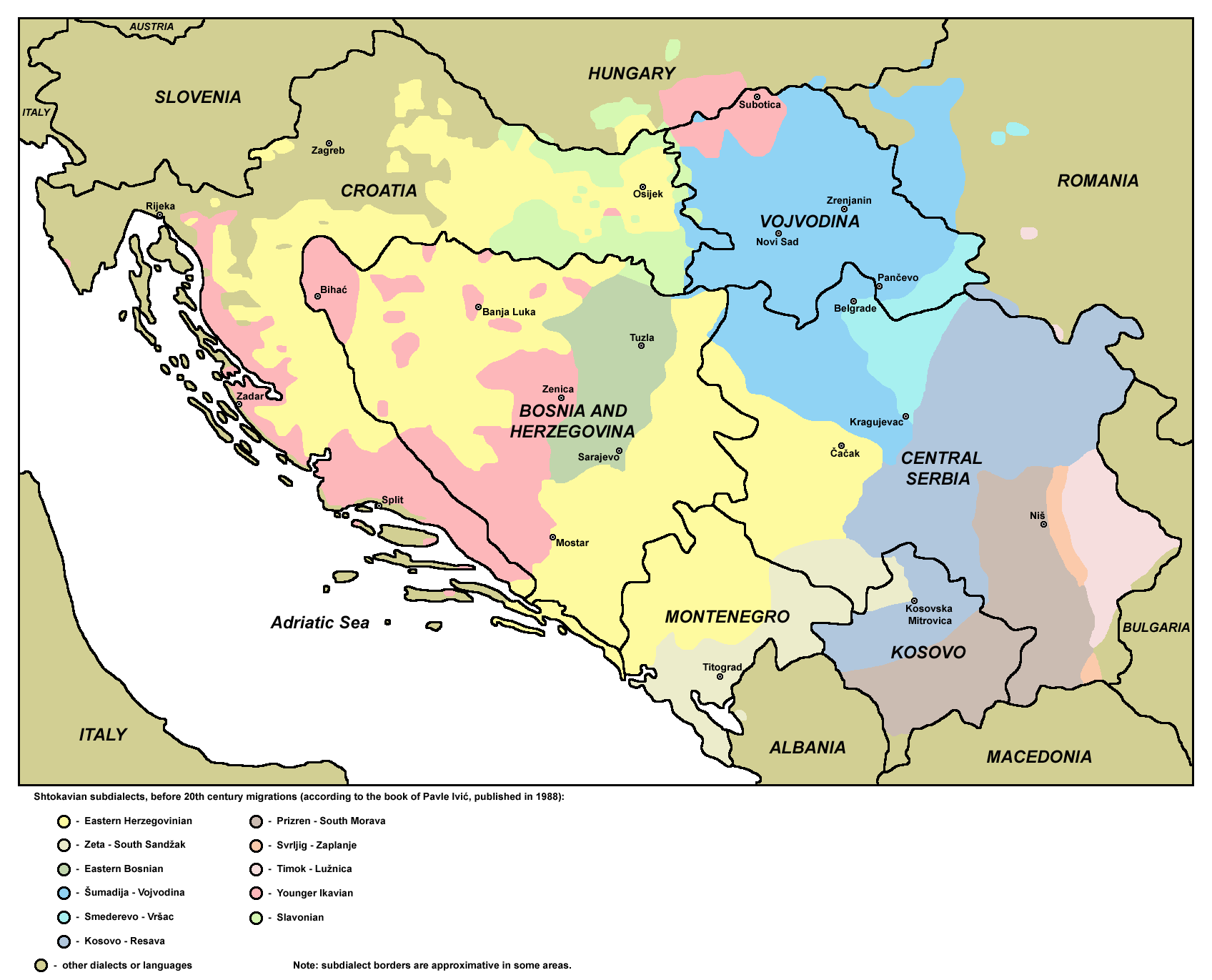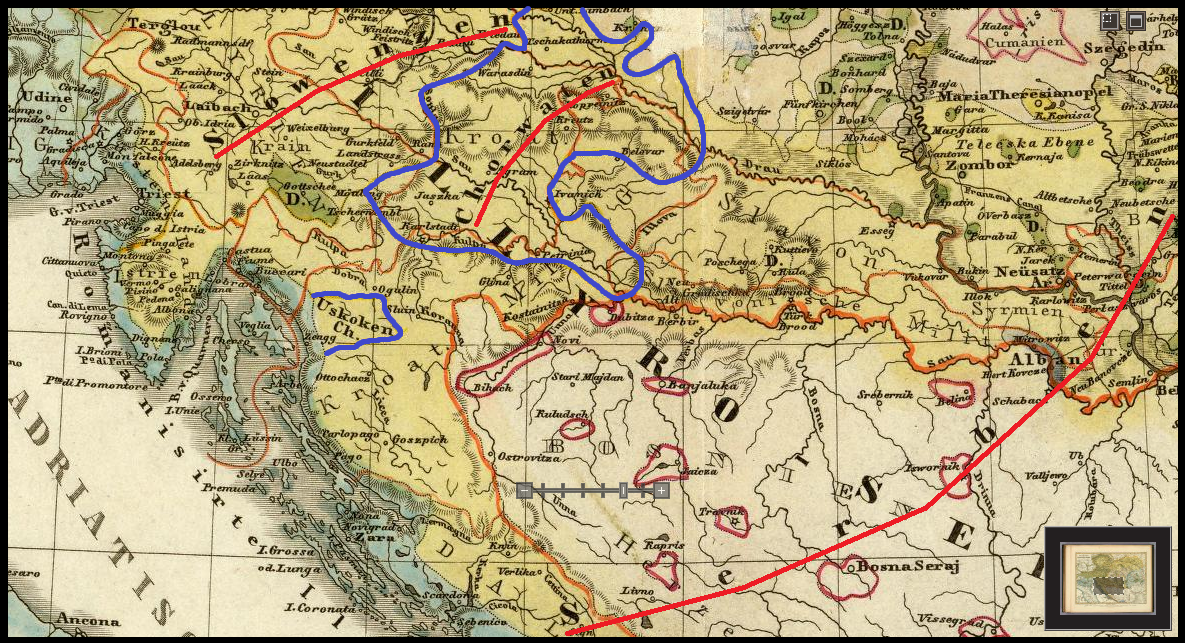In the 19th century European Romantic Nationalist movements broke out across the continent culminating in the unification of Italy and Germany as well as Pan-Slavist ambitions in Russia and the potential breakup of the multi-national Habsburg and Ottoman Empires into smaller nation states. What virtually all these national movements had in common was the belief that a nation was defined by its language. If people spoke the same language, that meant they were the same people and this was supposed to override differences in religion and historical development.
In the Balkans however the story turned out differently. Today Serbs, Croats and Bosniaks all speak the same language (Serbs call it Serbian, Croats call it Croatian etc.) yet consider themselves different nations solely because of their religion
Serbs = Orthodox
Croats = Catholic
Bosniaks = Muslim
The fact that these southern Slavs were never able to overcome their religious differences the way Germans (Protestants and Catholics) Hungarians and Bulgarians (Orthodox and Muslim) were able to is quite interesting. That doesn't meant there weren't attempts to unify today's Croats, Serbs, and Bosniaks as one people. There was Ljudevit Gaj's Illyrian Movement, Strossmayer's Yugoslavism and Vuk Karadzic's Pan-Serbianism.
My interest here is with the Serbian national movement, and in particular Vuk Karadzic's Serbian national ideolgoy. The main tenants of Karadzic's ideology were as follows:
1. A nation is defined by the language its people speak.
2. The South Slavs (exlcuding the Bulgarians) can be divided into three main language groups: Stokavians who were Serbs, Cakavians who were Croats, and Kajkavians who were Slovenes
The problem for Vuk Karadzic was that although Orthodox Stokavian speakers identified themselves as Serbs, the Catholic and Muslim Stokavian speakers did not. The Muslims called themselves Turks (at the time the Ottoman Empire was still ruling the Balkans) and most of the Catholics identified themselves as Croatian, Dalmatian, Slavonian etc in other words, they had a regional identification.
Because a nation was defined by its language, and all Orthodox Serbs spoke Stokavian, it followed that Stokavian was the Serbian language. Therefore all other other Slavs who spoke STokavian were Serbs regardless of their religion. Karadzic's Serbian nationalism at its core therefore argued this:
Before the Turks conquered the Balkans all Serbs had been ORthodox Christian with thier own medieval state and church. After the Ottoman Empire conquered Serbia, one part of the Serbian population fled from the Turks into neighboring Christian Austria and Hungary, while the other part of the Serbian population remained living under the Ottoman Empire. The same way centuries of Muslim rule under the Ottoman Empire made many Orthodox Serbs who stayed convert to Islam, so too centuries of Catholic rule under the Habsburg Empire made many Orthodox Serbs convert to Catholicism. Their change in religion however could not change their nationality, which was defined by their language.
Now obviously Karadzic's linguistic nationalism failed, because Serbs today exclusively identify themselves with Orthodoxy while Croats with Catholicism etc. However I'm interested to hear whether anyone thinks it was possible to overcome that religious division. Could today's Croats have been assimilated as Roman Catholic Serbs in the 19th century the way Protesant and CAtholic Germans overcame religious differences as well as Hungarians, Albanians and Greeks did.
In the Balkans however the story turned out differently. Today Serbs, Croats and Bosniaks all speak the same language (Serbs call it Serbian, Croats call it Croatian etc.) yet consider themselves different nations solely because of their religion
Serbs = Orthodox
Croats = Catholic
Bosniaks = Muslim
The fact that these southern Slavs were never able to overcome their religious differences the way Germans (Protestants and Catholics) Hungarians and Bulgarians (Orthodox and Muslim) were able to is quite interesting. That doesn't meant there weren't attempts to unify today's Croats, Serbs, and Bosniaks as one people. There was Ljudevit Gaj's Illyrian Movement, Strossmayer's Yugoslavism and Vuk Karadzic's Pan-Serbianism.
My interest here is with the Serbian national movement, and in particular Vuk Karadzic's Serbian national ideolgoy. The main tenants of Karadzic's ideology were as follows:
1. A nation is defined by the language its people speak.
2. The South Slavs (exlcuding the Bulgarians) can be divided into three main language groups: Stokavians who were Serbs, Cakavians who were Croats, and Kajkavians who were Slovenes
The problem for Vuk Karadzic was that although Orthodox Stokavian speakers identified themselves as Serbs, the Catholic and Muslim Stokavian speakers did not. The Muslims called themselves Turks (at the time the Ottoman Empire was still ruling the Balkans) and most of the Catholics identified themselves as Croatian, Dalmatian, Slavonian etc in other words, they had a regional identification.
Because a nation was defined by its language, and all Orthodox Serbs spoke Stokavian, it followed that Stokavian was the Serbian language. Therefore all other other Slavs who spoke STokavian were Serbs regardless of their religion. Karadzic's Serbian nationalism at its core therefore argued this:
Before the Turks conquered the Balkans all Serbs had been ORthodox Christian with thier own medieval state and church. After the Ottoman Empire conquered Serbia, one part of the Serbian population fled from the Turks into neighboring Christian Austria and Hungary, while the other part of the Serbian population remained living under the Ottoman Empire. The same way centuries of Muslim rule under the Ottoman Empire made many Orthodox Serbs who stayed convert to Islam, so too centuries of Catholic rule under the Habsburg Empire made many Orthodox Serbs convert to Catholicism. Their change in religion however could not change their nationality, which was defined by their language.
Now obviously Karadzic's linguistic nationalism failed, because Serbs today exclusively identify themselves with Orthodoxy while Croats with Catholicism etc. However I'm interested to hear whether anyone thinks it was possible to overcome that religious division. Could today's Croats have been assimilated as Roman Catholic Serbs in the 19th century the way Protesant and CAtholic Germans overcame religious differences as well as Hungarians, Albanians and Greeks did.

